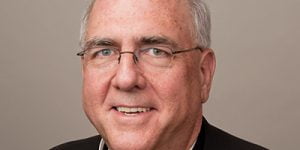by Archbishop Joseph F. Naumann
I have never been accused of being hightech. However, one of the few applications I have on my phone is Saintcast — a podcast produced and created by Dr. Paul Camarata, the head of neurosurgery at Kansas University Medical Center. Each episode contains current information about recent canonizations, beatifications or other saints who have been in the news.
Each episode also focuses upon a particular saint, usually one whose feast has just been or soon will be celebrated in the church’s calendar.
Last year around this time, an episode (no. 136) aired, which began with some audio clips from the New Orleans Saints winning Super Bowl XLIV. (Congratulations to Father Gary Pennings and all Green Bay fans for the Packers’ Super Bowl victory last Sunday!) This Saintcast also featured St. Paul Miki and 25 companions who were martyred in Japan on Feb. 5, 1597.
St. Francis Xavier, the remarkable Jesuit missionary, brought Christianity to Japan in 1549. The Japanese ruling dynasty welcomed Westerners, including Christian missionaries. The efforts of Catholic missionaries were remarkably fruitful. By 1590, there were more than 300,000 Japanese Catholics.
Unfortunately, in 1596, the rulers of Japan outlawed Christianity, asserting that it was destroying Japanese culture. Paul Miki, a native Jesuit catechist, was preparing for priestly ordination when he and 25 other leaders of the Catholic community in Japan were arrested.
The Japanese authorities tortured them brutally. Their left ears were severed, not only to inflict physical pain, but also to humiliate them in such a way as to serve as a deterrent — hoping to discourage other Japanese Christians from practicing their faith. In the dead of winter, they were paraded through Japan to make clear to others what would be their fate if they persisted in the Christian faith.
In the end, they were crucified in a wheat field near Nagasaki as a way of mocking the belief of Christians in the cross of Jesus. Paul Miki and his companions prayed and sang hymns as they were being tortured and executed. The following is taken from a contemporary account of the crucifixion of Paul Miki and the other Japanese martyrs:
“Our brother, Paul Miki, saw himself standing now in the noblest pulpit he had ever filled. To his congregation he began by proclaiming himself a Japanese and a Jesuit. He was dying for the Gospel he preached. He gave thanks to God for this wonderful blessing and he ended his sermon with these words:
“‘As I come to this supreme moment of my life, I am sure none of you would suppose I want to deceive you. And so I tell you plainly: there is no way to be saved except the Christian way. My religion teaches me to pardon my enemies and all who have offended me. I do gladly pardon the Emperor and all who sought my death. I beg them to seek baptism and be Christians themselves.’ Then he looked at his comrades and began to encourage them in their final struggle. Joy glowed in all their faces.”
Japanese Christians took soil from beneath the crosses of the martyrs and venerated it as relics of their heroism. The persecution of Christianity continued in Japan for more than 200 years.
In the late 1800s Japan again opened up to Christian missionaries. A few missionary priests from France came to Nagasaki and established a small mission chapel. Some Japanese men approached them and asked three questions: 1) Did they venerate Mary as the Mother of God? 2) Did they not marry? 3) Did they follow the pope of Rome?
When the French priests responded affirmatively to all three questions, the Japanese men told them that they have been waiting for them. Their Christian ancestors had assured them that the Christian missionaries would return.
A Japanese Christian community had survived through centuries of persecution and repression without the benefit of priests or any of the sacraments. Inspired by Paul Miki and his companions, they had passed on the teachings of our Catholic faith through their families.
The church holds up the saints for our edification to inspire us to live heroic lives of Christian faith and virtue. The communion of saints reminds us that we can invite the saints to be part of our prayer group, accompanying us as we approach Jesus, asking for whatever we need to lead lives that embody his Gospel. Though most of us will probably not be called to die a martyr’s death, we are called to live our Catholic faith with a passion and a heroism that will draw others — not to us, but to the One who is the source of our strength, our hope, our joy, our power to love.
I recommend that you subscribe to Saintcast. I know you will find it both interesting and inspiring. Even more, I encourage you to do whatever is required to pass on the truth and beauty of our Catholic faith within your family. If Japanese Christians were able to do so during 200 years of persecution and repression, surely we can plant firmly our Catholic faith in the hearts of our children. To borrow a line from a national Catholic radio host: “Be a saint! What else is there?”



